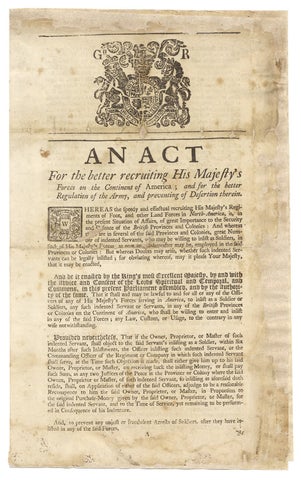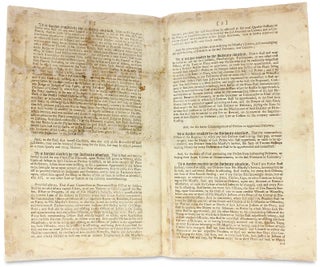An Act for the better recruiting His Majesty’s Forces on the Continent of America; and for the better Regulation of the Army, and preventing of Desertion therein.
—
An exceedingly rare Boston-printed 1756 act of Parliament to significantly enlarge the number of British troops in North America.
This act allowed British army recruitment officers to enlist and detain indentured servants for military service in the American colonies and the northern provinces. It was enacted, in part, after the British defeat at the Battle of the Monongahela in Pennsylvania during the French and Indian War.
The British policy of recruiting or “pressing” American colonial indentured servants into the army was unpopular. For example, in February 1756, elected representatives in Pennsylvania protested to Lt. Gov. Robert Hunter Morris against this grave injustice. This March 1756 act was intended to ease the concerns of American colonists and those subjects in the northern provinces. It did so by allowing the servants’ masters to get their servants back from the British army by refunding the enlistment money, or by ordering the army to pay financial compensation, as determined by a judge.
This new legal recourse had the unintended effect of greatly slowing the army’s efforts to raise troops. In late 1756, British Major-General Lord Loudoun, complained about the situation in New England where “…the People of the Country give every discouragement, Publickly and Privately, to prevent the People from Enlisting.”¹ The balance of the present act also concerns the upkeep of troop levels: the prevention of desertion by soldiers.
Many American colonists distrusted standing armies. Many were concerned about unjust Parliamentary laws, laws for which they had no say in enacting. These sentiments of distrust and concern were likely heightened by this Boston printing pronouncing the King’s desire to recruit their fellow American colonists to fight in the French and Indian War.
Description: An Act for the better recruiting His Majesty’s Forces on the Continent of America; and for the better Regulation of the Army, and preventing of Desertion therein.
[Colophon:] Boston: New-England: Re-printed by John Draper, Printer to His Excellency the Governour and Council. [1756]. Bifolium. Approx. 12¼ x 8 inches, 4 pages. Woodcut coat of arms of King George II at head of first page. Approximately 10–15 words with partial or total loss. Overall, no loss of sense. Expertly, extensively conserved; edges trimmed; old stains; good.
[145516]Evans 7677, one copy at MHS. ESTC W6074: MHS, AAS, NYHS. Cushing, Bibliography of the laws and resolves of the Massachusetts Bay… 592. Note: 1. Brumwell, Redcoats, The British Soldier and War in the Americas, 1755–1763, (New York, 2007). IB100
Price: $2,500.00

![[145516] An Act for the better recruiting His Majesty’s Forces on the Continent of America; and for the better Regulation of the Army, and preventing of Desertion therein. Acts, Laws.](https://rareamericana.cdn.bibliopolis.com/pictures/145516.jpg?width=768&height=1000&fit=bounds&auto=webp&v=1706601306)



